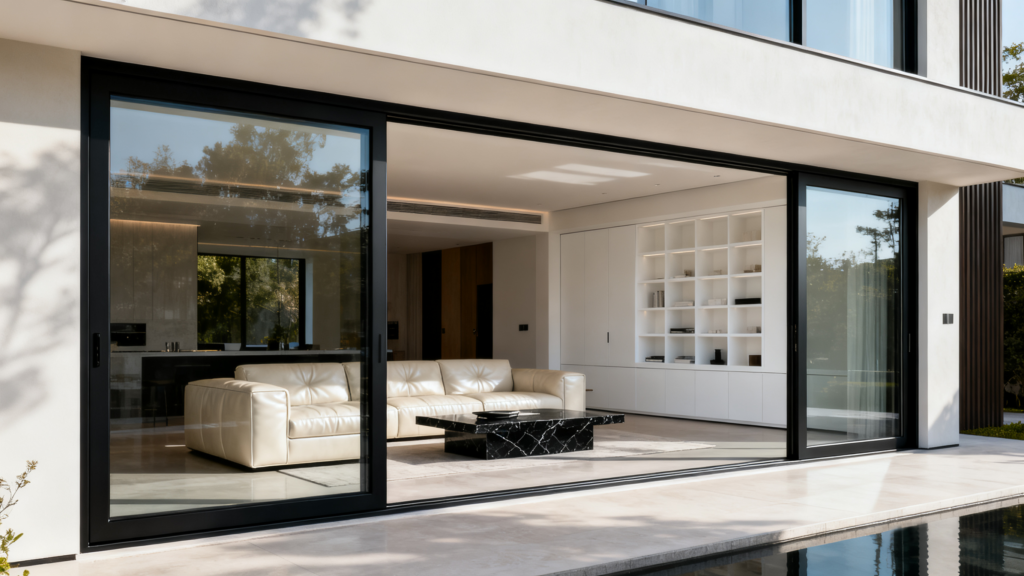In New South Wales, BASIX (Building Sustainability Index) has become a crucial requirement for both new residential developments and renovation projects. Among all performance factors evaluated by BASIX, the window and door system is one of the decisive contributors to overall energy efficiency.
Low-E (Low-Emissivity) glass has emerged as a key solution for meeting BASIX requirements. When combined with AS2047-certified systems from a factory-direct supplier, it significantly enhances thermal performance, comfort, and long-term energy savings.
Why BASIX places so much emphasis on windows
More than 40% of a home’s heat loss or gain occurs through windows.
This is why BASIX pays close attention to:
• U-Value (insulation performance)
• SHGC (Solar Heat Gain Coefficient)
• Air leakage and water tightness
• Whole-window energy performance
A poorly performing window system can easily cause a project to fail BASIX assessment—even when the walls and roof are well insulated.
This drives many Australian developers and homeowners to choose Low-E glass combined with high-performance aluminium window systems, especially those produced by AS2047-certified factory manufacturers.
Key Advantages of Low-E Glass Under BASIX Requirements
1. Lower U-Value for greater winter insulation
Low-E glass significantly reduces heat transfer, keeping indoor warmth from escaping during winter.
A lower U-Value directly helps residential projects meet BASIX thermal targets.
2. Controlled solar heat gain (SHGC) for cooler summers
Sydney and coastal NSW require strong solar control.Low-E coatings block a large portion of solar radiation, reducing indoor temperatures by 2–5°C.
• This leads to:
• Higher BASIX scores
• Reduced cooling loads
• Lower long-term energy bills
3. Enhanced performance when paired with AS2047-certified systems
Glass performance alone is not enough.
BASIX evaluates whole-window performance, which is why AS2047 certification is crucial.
Factory-direct systems from M&C Windows & Doors feature:
• Strong structural integrity for high wind zones
• EPDM seals and multi-chamber aluminium profiles
• High air tightness for reduced heat leakage
• Superior water tightness for coastal or heavy-rain regions
This ensures the Low-E glass reaches its full performance potential.
4. Factory-direct supply ensures consistency & tailored performance
Compared to trading suppliers, factory-direct manufacturers offer:
• Stable consistency across all batches
• Full AS2047 performance testing before shipping
• Custom Low-E configurations based on BASIX modelling
M&C Windows & Doors offers options such as:
• Single-silver or double-silver Low-E
• Insulated Low-E glazing
• Argon-filled glazing units
• 6–20mm glass configurations
allowing developers to fine-tune U-Value and SHGC according to BASIX requirements.
Case Study: Sydney Hills District – BASIX Energy Upgrade
In a recent home renovation project, M&C’s insulated Low-E window system achieved:
• 22% improvement in overall BASIX thermal performance
• 3–4°C lower indoor temperature during summer
• Significantly reduced air-conditioning usage
• Full AS2047 structural, air, and water performance compliance
This showcases how Low-E systems play a vital role in meeting BASIX standards.
Under the strict BASIX framework, windows are one of the most impactful materials for improving energy performance.
A combination of Low-E glass, AS2047-certified window systems, and factory-direct manufacturing provides developers and homeowners with reliable, long-lasting, and energy-efficient solutions.
M&C Windows & Doors
Delivering high-performance systems for a more efficient and comfortable Australian home.

